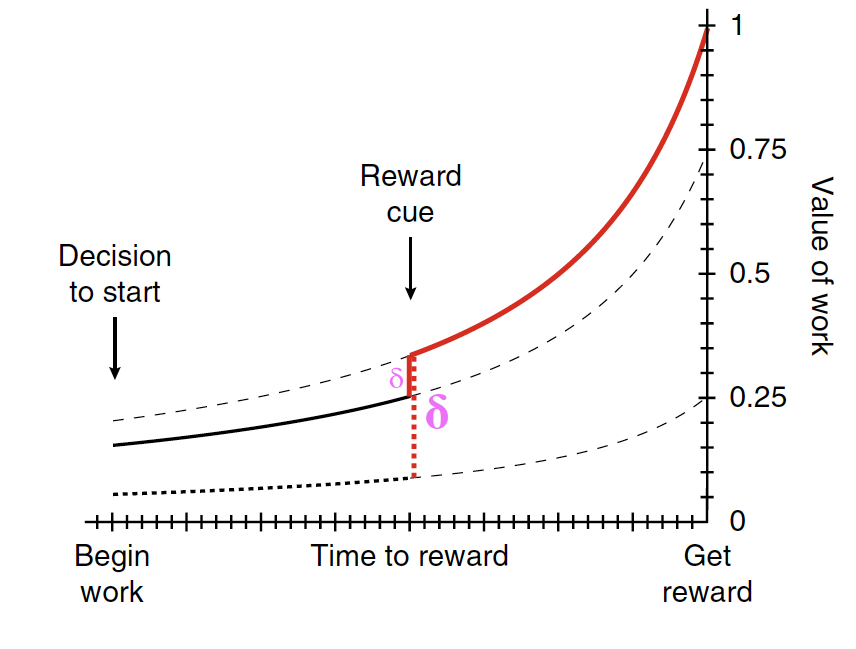Dopamine!
Here’s one of my favorite graphs of dopamine, the neurotransmitter responsible for guiding us towards rewards—that’s why we get a hit of dopamine when we learn (it stamps in where the rewards are), as well as why it’s so important in motivating behavior.
Think of playing a video game: it’s addictive because you know exactly what you need to do to get to the next level.
Motivation is easy if we want what’s on the other side, the reward is certain, we know exactly what steps we have to take to get there, and our ego does not get in the way.
Real life does not give us any of these niceties.
All methods for overcoming procrastination, therefore, are essentially designed to get us over the block and make the reward appear closer/more certain, to make the journey rewarding, to placate our ego, and move us through the discomfort and emotional crap—the uncertainty and ego-blocking effects that might accompany rejection or a poor performance.
What Procrastination Looks Like
- AVOIDANCE
- “If I ignore it, it will go away.” Emotional avoidance.1Most of the list below was taken from Brown’s counseling services
- It doesn’t matter, I don’t need to do that well.” Lowering your standards; self-fulfilling prophecy of rejection
- “I can’t start writing until I have the perfect font.” Partial procrastination: only chipping away at one component of the task.
- “I’m so good, I only need to spend an hour studying for the boards.” Overestimating your abilities or underestimating the work involved.
- Substituting one “worthy” activity for another, i.e., the “Oh look, I need to clean” effect.
- Believing that repeated “minor” delays are harmless. 5 minutes + 5 minutes + 5 minutes + 5 minutes + 5 minutes… 5 minutes ^ ∞ = ∞ minutes
- Tricking ourselves into thinking that we’re actually making progress, when we’re actually just performing “Look at Me Doing My Important Thing” Theater.
- Display commitment to a task rather than actually doing it: Taking your books on vacation but never opening them or declining an invitation but still not pursuing the work at hand. This behavior allows you to stay in a constant state of unproductive readiness to work—without ever working.
- Getting bogged down in choices, overthinking minutiae. (See: I need the perfect writing tool.)
Why We Procrastinate
1. Fear
- Evaluation anxiety. “The responses of others aren’t under your direct control, and overvaluing those responses can create the kind of anxiety that will interfere with your getting work accomplished.”
- Perfectionism. “Having unreachable standards for the outcome of your work will discourage you from pursuing a task. Remember, perfection is unattainable.”
- Fear of the Unknown (don’t know what to expect) or fear of failure (don’t know how to succeed)
2. We Don’t Actually Want to Do It
- Lack of relevance/interest. If something has been imposed on you, but is not consistent with your goals, interests, or identity, it is not seen as meaningful/personally relevant, and worth pursuing.
3. We’re Not Reading the Signs Right
- Interpretation of Difficulty. Few tasks are executed without any difficulty. We are likely to persist at what seems possible and important. Failure to perceive success on the horizon leads people to interpret difficulties (environment, conditions) as a sign to stop or a signal of impossibility.
- Ambiguity. Failure to understand what is required to accomplish a task in a given time frame
- Tendency to “dramatize a commitment” rather than doing it. (Emotional avoidance.)
- Inability to distinguish between actions that actually bring you closer to the finish line. (Do you really need a new font?)
How to Do the Thing
Positive Social Pressure
Work with people who make you better
Move the goal posts closer
Don’t think about writing all of the proposals—just write a paragraph
It’s due tomorrow
JUST DO A SHITTY FIRST DRAFT.
Focus on the action
One foot in front of the other—don’t look at the balance beam
Put it into perspective
You’re not going to die. And if you are, just get it over with.
Self-affirmation
You have done difficult things in the past and succeeded. This is one of them.
